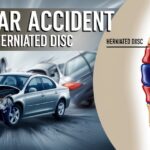Understand how car accidents can lead to the development of a hernia by gaining knowledge about the symptoms, diagnosis, and treatment of hernias. Explore ways in which one can recover as well be monetarily compensated for the effect a car accident may have through the acquisition of a hernia.
Can a Vehicle Accident Result in a Hernia? Everything You Should Learn
Hernia formation is a condition that is normally caused by heavy lifting or stress, however, did you know that car accidents can also lead to a situation where hernias are formed? If you have had a car accident just recently and abdomen is swollen, this is the article which will help you understand the situation more regarding the incident and its geographical abnormalities that occurred through the said impact.
In this guide, we will discuss various subjects including traumatic hernia formation from the impact of a collision, hernia development, hernia signs, diagnostic procedures, treatment options, and car accidents in general. This post has you covered whether you are a car accident victim or someone who is keen on knowing the health facts or the legal aspect of car accidents.
What Is a Hernia?
A hernia occurs when an organ or tissue pushes through a weak spot in the surrounding muscles or connective tissue. While hernias are commonly associated with physical strain, trauma from accidents can also play a role.
Common Types of Hernias
- Inguinal Hernia (groin area): The most common type, occurring in the lower abdomen or groin.
- Femoral Hernia (inner thigh): Often seen in women and less common than inguinal hernias.
- Umbilical Hernia (near the belly button): Typically seen in infants but can also occur in adults.
- Incisional Hernia (at surgical sites): Weakness in the abdominal wall following surgery.
Causes of Hernias
Hernias broadly result from increased pressure on a weakened area of the abdominal wall. Typical causes include heavy lifting, persistent coughing, obesity, and yes, sudden trauma—such as a car accident.
How Can a Car Accident Cause a Hernia?
Many people may not immediately connect a car accident with a hernia, but the mechanics of trauma tell a different story.
Impact of Sudden Trauma
The force of an accident often generates immense abdominal and core pressure. For example, the jerking motion caused by a collision can compress abdominal walls, creating conditions favorable for hernia development.
Increased Risk Due to Impact
Accidents that involve airbag deployment or seat belt tightening can place significant strain on the muscles in the abdomen. This strain, coupled with sudden jerking motions, can weaken the abdominal wall, potentially causing a hernia.
Types of Hernias Accidents Might Cause
- Abdominal Hernias are the most likely to occur due to trauma, including direct blunt force to the abdomen.
- Inguinal Hernias can also result from increased pressure caused by sudden trauma in the lower abdominal region.
Common Symptoms of a Hernia After a Car Accident
A hernia may develop immediately or gradually after a car accident. Knowing the symptoms can help you catch it early.
Pain and Discomfort
One of the first signs could be abdominal or groin pain, especially during physical exertion.
Visible Bulge
Hernias often create a noticeable bulge in the affected area. This is an important red flag to look out for after a car accident.
Other Symptoms
You may also experience nausea, vomiting, difficulty lifting objects, or strain when coughing. These symptoms warrant immediate medical attention.
How to Diagnose a Hernia After an Accident
Medical Examination
If you notice any signs of a hernia post-accident, consult a healthcare professional for a physical examination.
Imaging Tests
Doctors may recommend X-rays, ultrasounds, or CT scans to confirm the hernia and assess its severity. These tools are especially helpful in detecting hidden hernias that may not show clear physical symptoms.
When to Seek Medical Attention
Seek immediate medical attention if your pain worsens, the bulge hardens, or you experience nausea or vomiting. These are signs of a complication, such as a strangulated hernia.
Treatment Options for a Hernia Caused by a Car Accident
Conservative Treatments
For minor hernias, doctors may recommend rest, pain relief, and lifestyle adjustments to manage symptoms.
Surgical Intervention
Often, hernias require surgery, especially if the hernia is large or causing significant discomfort. Options include open surgery and laparoscopic repair.
Rehabilitation
Post-surgery, you’ll need to follow a recovery regimen, including light exercises to strengthen your core and prevent future complications.
Preventing Hernias After Car Accidents
While it’s impossible to predict accidents, you can take steps to reduce the risk of hernia formation afterward.
Proper Posture and Support
Ensure your seat belt is adjusted correctly to reduce unnecessary pressuring of your abdomen during an impact.
Strengthening Core Muscles
Maintain strong abdominal muscles through exercises like planks, which can help fortify your abdominal wall.
Post-Accident Care
Regular check-ups after an accident, even if you feel fine, may help in identifying hidden injuries like hernias before they worsen.
Can You File a Claim for a Hernia Caused by a Car Accident?
Personal Injury Claims
If a car accident caused your hernia, you may be eligible to include it in your personal injury claim. This could cover costs for medical treatments, surgeries, or missed workdays.
Legal Help and Compensation
Consult a personal injury lawyer to fully understand your rights and options for seeking compensation.
Take Action for Your Health and Legal Rights
Understanding the connection between car accidents and hernias is crucial for timely medical and legal action. If you suspect a hernia after an accident, consult a healthcare professional promptly. Additionally, reach out to a legal advisor if you believe negligence or another party caused your injury.
FAQs
Can a minor car accident cause a hernia?
Yes, even minor accidents can cause a hernia if the impact applies enough pressure or strain to the abdominal area.
How long after a car accident can a hernia develop?
Hernias can develop immediately or take weeks or months to become noticeable, depending on the degree of internal damage.
Is surgery the only treatment for a hernia caused by a car accident?
Not always. Small hernias may respond to rest and lifestyle changes, but larger or painful hernias typically require surgery.
Can I prevent a hernia after a car accident?
While you can’t always prevent it, proper seat belt use, attention to posture, and post-accident medical checks can reduce your risk.


